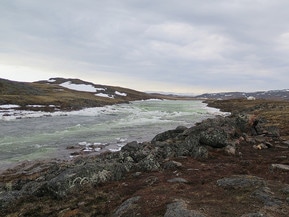Iqaluit, Nunavut
Year(s) Funded: 2015-2016
Topic Area: Adaptation Planning Contact: Taha Tabish, Qaujigiartiit Health Research Centre ([email protected]) Partners: Qaujigiartiit Health Research Centre Website: http://www.qhrc.ca Title: Implementing a ‘Design Thinking’ Research Process to identify concrete community-based actions to mitigate the effects of climate change on health and wellness in Inuit communities in Nunavut
Action: A community-based workshop was conducted using principles of Design Thinking to develop climate change adaption actions within and across various sectors at the community level. Key players were researchers, artists, youth, and representatives from municipal and territorial governments. The workshop was held in Iqaluit, NU, with attendees from four other Nunavut communities also in attendance (Qikiqtarjuaq, Baker Lake, Arviat, and Cape Dorset). Despite challenges due to scheduling, weather, and availability of attendees, the workshop was well-attended and well-received, with three major priority areas and projects identified by participants: a mobile tool for community-based collection of climate change observations/data; land safety digital multimedia resources; and an online community ride-share program to better utilize motor vehicles in community (mitigating greenhouse gas emissions). An adapted version of the Human-Centered Design framework was used to ground the process, with four main components: 1. Hear – Determine whom to talk to, gather stories, document observations; 2. Create – Generate opportunities and solutions that are applicable to the whole community; 3. Deliver – Take top solutions, make them better, move them toward implementation; and 4. Share – Make workshop resources and findings available to other individuals, organizations, and communities. Results: Overall, the design workshop was seen as a success by the participants. They identified the importance of a co-creation methodology to solutions development, and its absence in the usual state of affairs. Participants were pushed to think creatively, and bring their knowledge and experience not just as working professionals, but to also draw on other aspects of their lives. The impacts of climate change are being felt by our Northern communities, and are projected to grow in the future. This fact makes it that much more important to meaningfully engage with our communities to develop and co-create the solutions to address them. There is potential for this approach to be applied to future projects and designing of solutions for other climate change and non-climate change applications. Outputs: N/A |
